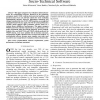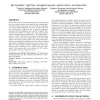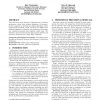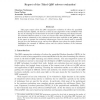170
Voted
VLC
2008
15 years 2 months ago
2008
Given the difficulty of setting up large-scale experiments with real users, the comparison of content-based image retrieval methods using relevance feedback usually relies on the ...
99
Voted
TSMC
2008
15 years 2 months ago
2008
Abstract--This paper compares two evaluation criterion frameworks for sociotechnical software. Research on the technology acceptance model (TAM) confirms that perceived usefulness ...
122
Voted
IPM
2007
15 years 2 months ago
2007
This paper reviews research on automatic summarising in the last decade. This work has grown, stimulated by technology and by evaluation programmes. The paper uses several framewo...
114
click to vote
SPEECH
2008
15 years 2 months ago
2008
Evaluation of spoken dialogue systems has been traditionally carried out in terms of instrumentally or expert-derived measures (usually called ``objective" evaluation) and qu...
107
click to vote
SIGIR
2008
ACM
15 years 2 months ago
2008
ACM
Relevance evaluation is an essential part of the development and maintenance of information retrieval systems. Yet traditional evaluation approaches have several limitations; in p...
SIGIR
2008
ACM
15 years 2 months ago
2008
ACM
Information retrieval evaluation has typically been performed over several dozen queries, each judged to near-completeness. There has been a great deal of recent work on evaluatio...
109
click to vote
SIGIR
2008
ACM
15 years 2 months ago
2008
ACM
The goal of system evaluation in information retrieval has always been to determine which of a set of systems is superior on a given collection. The tool used to determine system ...
81
Voted
SIGIR
2008
ACM
15 years 2 months ago
2008
ACM
There has been recent interest in collecting user or assessor preferences, rather than absolute judgments of relevance, for the evaluation or learning of ranking algorithms. Since...
108
click to vote
IIE
2007
15 years 2 months ago
2007
Although there are many high-quality models for program and evaluation planning, these models are often too intensive to be used in situations when time and resources are scarce. A...
116
click to vote
JSAT
2006
15 years 2 months ago
2006
This paper reports about the 2005 comparative evaluation of solvers for quantified Boolean formulas (QBFs), the third in a series of non-competitive events established with the ai...







